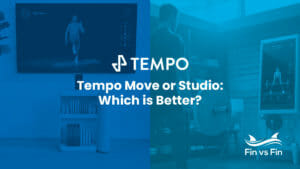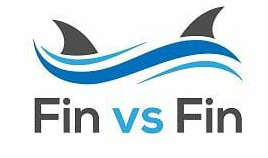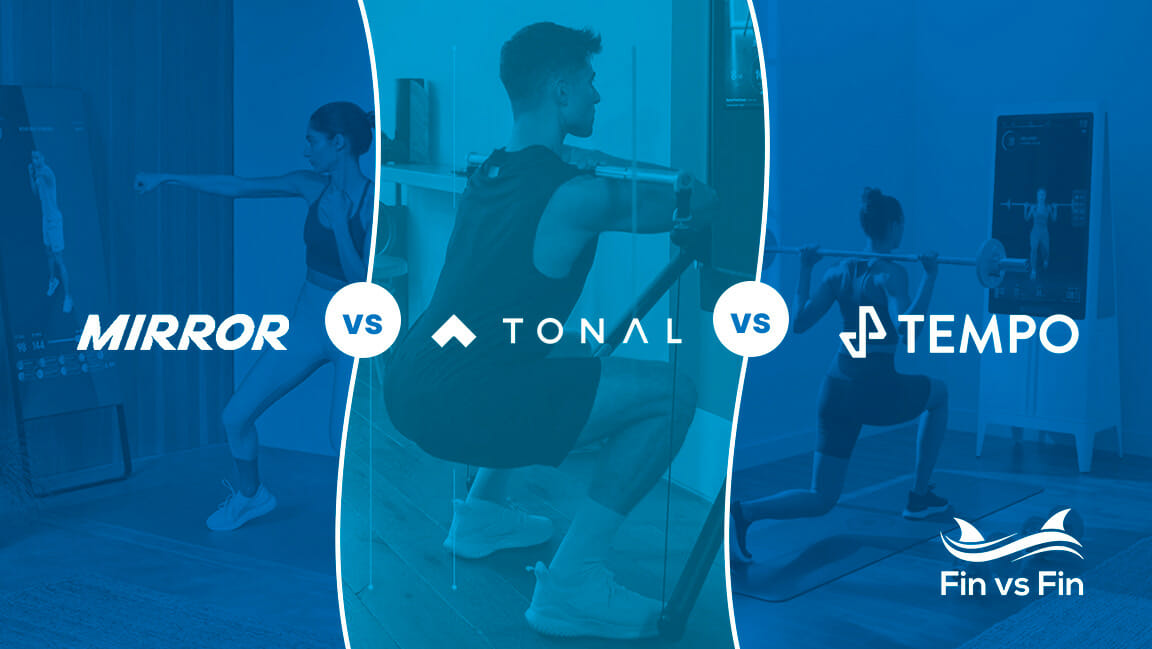Our team has had our hands on several Tempos, a Tonal and tried out the Mirror over the past few months. Each device has pros and cons – read the entire review to get our opinions, but here is the TLDR:
Tonal – this is by far the premium option, but it won’t make sense for everyone. This is the best option if 1) you love weight lifting, resistance or high intensity workouts, 2) you are strong enough to do most weight moves with weights of 5 pounds or more 3) you’ve got a lot of space, and a wall where you can install it 4) you can afford the price. The instructors are awesome, the device is amazing, the range of moves and workouts is excellent. If you’ve got the space, money and want to work lifting into your routine, get the Tonal.
Mirror – on the opposite end of the Tonal, this is perfect if you are looking for a more affordable option and aren’t very into weights. While they do now have weights that you can purchase, the focus of this device is really body-weight and resistance band oriented workouts. The Mirror offers great instructors at an affordable price – although you still need to attach it to a wall; however, unlike the Tonal it doesn’t have large weight arms that extend out on the sides, so you need less space. Don’t need a lot of weights and want to save some cash? Go for the Mirror. (And use our exclusive discount code FIN350 at checkout for $350 off).
Tempo – if you aren’t excited about attaching your fitness device to the wall (for example, if you are renter with delicate walls, or if you are moving soon), and you want the option to do some weights, Tempo might be the best bet for you. It’s a stand alone device, with a variety of weight plates and bars that you can purchase, so this can go pretty much anywhere. The new Tempo Move is even smaller (and more affordable), making Tempo the most versatile of the companies that we review here. Thank you to the team at Tempo for giving us some devices for free to try out. Go for the Tempo if you are moving soon, don’t want to dedicate a space in your house permanently to working out, or if the more modest price vs. the Tonal works for your budget. And the Move is great if you are looking for training on a budget (and if you have workout space near a TV!)
With that out of the way, Let’s dig into the major home gym brands like Tonal, Tempo, Mirror and Echelon Reflect to see if any are best for your home.
First, let’s compare the different types of workouts available with each home fitness option, so you can make sure the one you choose offers the training you want. We don’t want you to find out that the one you pick doesn’t offer your yoga if that’s your favorite way to workout!
Workout selection: what workouts do Mirror, Tonal, Tempo Fit, and Echelon Reflect offer?
We all have the style of working out that we individually like best – so let’s explore the different offerings by Tonal, Mirror, Echelon Reflect and Tempo Fit to see if they’ve got your fitness routine covered.
The chart below lists out the types of programs and classes that we know about for each company. The more we use these devices the more types of workouts we discover. For example, we didn’t even know the Tonal offered pre-natal workouts (I mean, I’m not pregnant, so wasn’t looking for them), but found some when I was searching for some lower impact options the other weekend.
Mirror vs Tonal vs Tempo vs Echelon: Workouts offered | ||||
|---|---|---|---|---|
| Arms + Abs | ✔️ | ✔️ | Probably | Probably |
| Barre | ✔️ | ✔️ | Probably | ✔️ |
| Bootcamp Workouts | ✔️ | Probably | Probably | Probably |
| Boxing | ✔️ | Probably | Probably | ✔️ |
| Cardio | ✔️ | ✔️ | ✔️ | ✔️ |
| Dance | ✔️ | ✔️ | ❌ | ❌ |
| Family Workouts | ✔️ | ✔️ | ❌ | ❌ |
| Kettlebell | ✔️ | ❌ | ❌ | ❌ |
| Kickboxing | ✔️ | Probably | Probably | ❌ |
| Meditation | ✔️ | ✔️ | ❌ | ✔️ |
| Partner Workouts | ❌ | ✔️ | ❌ | ❌ |
| Pilates / Core | ✔️ | ✔️ | ✔️ | ✔️ |
| Pre and Post Natal | ✔️ | ✔️ | ❌ | ❌ |
| Strength | ✔️ | ✔️ | ✔️ | ✔️ |
| Stretching | ✔️ | ✔️ | Probably | ✔️ |
| Toning | ✔️ | ✔️ | Probably | ✔️ |
| Yoga | ✔️ | ✔️ | Probably | ✔️ |
| Zumba | ❌ | ❌ | ❌ | ✔️ |
| Website |
Another important difference is if there are live classes that you can attend. Companies like Echelon Reflect and Mirror let you pick from live classes that aren’t recorded, so you’ll be watching an instructor run you through the program. For Echelon, you have the option to pay $19.99 per month for the pre-recorded classes, or $39.99 per month for the recorded classes and the live ones. Tempo includes live and on-demand classes in their $39 per month subscription price. Tonal’s home gym now has live fitness classes, which is new from when we first reviewed the device. So you can use their on demand selections, or jump into the scheduled live classes, where the instructors give shout-outs to people hitting PRs and in the class.
Feature Comparison: Tonal, Tempo, and Mirror
Beyond the workouts and workout classes, it’s important to understand what other features these machines will give you.
Mirror vs Tonal vs Tempo vs Echelon: Feature Comparison | ||||
|---|---|---|---|---|
| Equipment Type | Wall mounted screen | Wall mounted screen and pulley system | Workout armoire | Wall mounted screen |
| Screen Size | 40" | 24" | 42" | 39" - 40 inch version 32" - 50 inch version |
| Resistance Equipment | Training bands (elastics) | Built-in electromagnetic arms | Barbell, dumbbells and plates | None |
| Equipment Colors | Black | Black | White or Black | Black |
| Touchscreen | ❌ | ✔️ | ✔️ | 40 inch -- ❌ 50 inch -- ✔️ |
| Live Classes | ✔️ | ✔️ | ✔️ | Extra Charge |
| Speakers | 10w stereo speakers | 15w stereo speakers | 60w stereo speakers | 8w speakers - 50 inch |
| Bluetooth | ✔️ | ✔️ | ✔️ | ✔️ |
| Height | 52" | 50.9" | 72" | 39" - 40 inch 47.75" - 50 inch |
| Width | 22" | 50.9" | 26" | 20" - 40 inch 24" - 50 inch |
| Depth | 1.4" | 5.25" | 16" | 24" |
| Weight | 70 lbs | ~100 lbs | 100 lbs | 26 lbs |
| Monthly Subscription (Excluding Device) | $39 per month | $49 per month | $39 per month | $39 per month |
| Website |
It’s important to point out that Tempo and Tonal have serious weight lifting / resistance training features. And a key difference with Tempo is the “form factor” – while the others require that you attach them to the wall, Tempo is more like a cabinet or armoire. It stands alone, requires no installation, and can be moved around. A cool feature is that it comes with weights, and neatly stores all the equipment inside its doors when not in use.
We do really like Tempo for both cardio + weight training for people who don’t want to attach anything to their wall.
How much do Mirror, Tonal, Tempo and Echelon Reflect cost?
So which home gym is a better deal from a price perspective, Mirror, Tonal, Tempo or Echelon? The cost comparison is not as straightforward as you’d think. That’s because there is the upfront hardware purchase as well as the monthly subscription costs that you need to have access to the on demand fitness classes. To make it even more confusing, some of the companies have monthly financing or “pay-as-you-go” offerings.
Smart Mirror Price Comparison | ||||
|---|---|---|---|---|
| Hardware Cost | $1,495 use code FIN350 for $350 off ($100 off the unit + free shipping, which normally costs $250) | $3,495 - base model +$495 for accessories | $2,495 | $999 - 40 inch $1,640 - 50 inch |
| Delivery Price | Not included | Not included | Not included | Not included |
| Monthly Subscription (Excluding Device) | $39 per month | $49 per month | $39 per month | $39 per month |
| Live Classes | Included in subscription | ❌ | Included in subscription | $39.99 per month (includes on demand classes as well) |
| Financing | $42 per month | $79 per month | $69 per month | $49 per month for 40 inch $54 per month for the 50 inch |
| 36 month financing | 48 month financing | 36 months for financing | $54 for 36 months for the 50 inch | |
| Website |
The clear winner on price alone is the 40 inch Echelon Reflect. At just less than $1,000, it’s hundreds — if not thousands — of dollars cheaper than the home gyms offer by Tonal, Mirror and Tempo. With Echelon, you’ve also got the option to stick with the cheaper $19.99 per month subscription plan, which gives you access to the one demand workouts but not the live classes. Again, the subscription cost is much lower than the $39 to $49 monthly subscriptions offered by the others. That said, Echelon Reflect’s screen is smaller than the others, and in our opinion, their workout experience isn’t as high quality.
Note on the financing — all these companies offer financing through third party financing companies. The prices quoted are all based on what most of these companies call “starting at” pricing for a 36 month payment plan, so you may pay more depending on your credit history.
Also — don’t forget about shipping! You are likely to pay $200 or more for delivery and installation, depending on where you live. So factor that into your overall cost of ownership. Given recent supply chain shocks and surging demand, you may also have to wait a while for your home gym delivery. Let’s dive into the cost of each so you can see what you get for the price.
How much does Lululemon’s Mirror gym cost?
If you go with Mirror’s home gym, you’ll have three different expenses to consider – the price of the hardware + the monthly subscription + delivery fee. Mirror’s hardware costs $1,495, which you can also finance for as little as $42 a month with a 36 month financing plan. Mirror offers on-demand and live classes, so you’ve got some great workout options — at a cost of $39 per month. Don’t foreget to use code FIN350 at checkout for $350 off. | Source: Mirror |
How much is Tonal?
| Similar to Mirror and Tempo, Tonal’s overall cost includes the hardware price, a delivery fee and the monthly workout subscription costs. The actual gym hardware starts at $3,495. But, you’ll probably also want the accessory kit (which includes handles, a bar, a rope, bench, mat and roller) so you can do the resistance and strength training workouts. The accessory kit will add an extra $495 in price, bringing the total upfront hardware cost to $3,990. Financing starts at $73 per month for a 48 month plan. Monthly subscriptions are $49 per month, so more expensive than the competition by at least ten dollars. | Source: Tonal |
How much is an Echelon Reflect?
The overall cost of an Echelon Reflect should include the equipment, delivery fee and the monthly subscription. With 2 equipment options and 2 monthly plan options (that you can also get on a yearly, reduced cost) figuring out what the overall cost is going to be is a little confusing! Let’s break it down:
- Equipment cost
- $999 for the 40″ model
- $1,640 for the 50″ model
- Monthly fitness subscription cost
- $19.99 per month for on-demand classes only
- $39.99 per month for on-demand + live workouts
You can also save on the subscriptions by committing upfront to twelve months with the annual plan.
The 40 inch is by far the lowest cost connected gym that we’ve seen, and the 50 inch is priced competitively against the Mirror and Tempo Studio. If you are on a budget, Echelon offers a lot of bang for your buck. You can also buy it on Amazon — rather than direct from the brand — if you prefer.
How much is a Tempo Studio?
Tempo’s price comes in at the upper half of our list, but you do get a lot. In addition to the touchscreen fitness center, you get a lot of strength training accessories included in the base cost. Like Mirror and the others, Tempo Studio’s overall cost will include the equipment, delivery and the monthly subscription. We’ll break down all the equipment you get for the $2,495 base price in a moment. The subscription is $39 per month – in line with the others.
Now – more on the hardware cost. In addition to the touchscreen/connected workout equipment, you get a ton of weight gear and other equipment. Each Tempo Studio comes with:
|  Source: Tempo Source: Tempo |
So that’s a ton of versatile equipment included for the base price. It’s worth noting that Tempo recently released a much lower cost home gym called the Tempo Move for just $495 $395. It’s a smaller, more portable offering that doesn’t include a screen, but instead leverages the display on your smartphone. For a more comprehensive review of Tempo’s Move vs Studio, check out our comparison!
Another consideration – Which home gym company will still be around in 5 years?
Typically, when you purchase a piece of fitness equipment, you don’t need to think too much about the financial health of the manufacturer. However, Mirror, Tonal and Tempo sell “connected” devices, so you will need the company you buy from to stay in business so you can continue to have access to the live fitness classes, the on-demand workouts, your data, etc. If the company you choose goes bankrupt, you may end up with a thousand dollar hunk of glass and metal taking up space in your home.
To that end, we’ve also analyzed the financial stability of Mirror and it’s competitors, Tonal, Tempo and Echelon, so that you can feel comfortable that the brand you choose will be around to keep you working out for years to come. We’ve used financial data from government filings and from Crunchbase, a database of venture capital investments. And, while we can’t promise that the companies that we’ve reviewed will be able to stay in business, we hope that this data will give you some comfort about the smart home gym players.
Financial stability of Mirror vs Tempo vs Tonal and Echelon
- Mirror – Mirror was acquired by Lululemon, a publicly traded company (NASDAQ: LULU). As a such, there is a ton of financial data available. For their fiscal year ended Feb, 2020, Lululemon had over $637 million in profit – so it’s a pretty healthy company. Hopefully they continue to invest in Mirror’s technology.
- Tempo – Tempo is a private company that has raised venture capital financing. Like most startups that raise VC funding, they are likely not profitable. That said, Tempo has raised an impressive almost-$80 million in funding, which seems like enough cash to stay in business for a while.
- Tonal – Tonal is also another private company that has raised VC funding. In fact, they’ve loaded up with over $450 million in VC dollars… which is a ton. The most recent round of funding was announced in March 2021, and was $250 million. So they’d better be in business for a while! Tonal also recently inked a huge sponsorship deal with Lebron, for what it’s worth.
- Echelon – This is yet another private company that’s raised capital from venture investors. In December 2020, Echelon raised $65 million from Goldman Sachs, a respected investment bank. Like Tempo, Echelon should have sufficient runway to last for a while!
Head to head comparisons
Most of the people we’ve interviewed for this review were only comparing two of the options. Let’s dig in to look at what we believe the most common ones are to compare.
Tonal vs Tempo
The main difference between Tonal and Tempo is price. Tonal is clearly a more expensive option than Tempo, especially if you look at Tempo’s newest product, the low-priced Move. Another huge difference is that Tonal needs to be installed on your wall – making it a lot less portable and a bit more of an effort vs. the Tempo. On the flip side, the built-in resistance bars of the Tonal ARE the industry leading tech right now, so if you must have the coolest piece of fitness equipment on the market, then that’s the best bet for you.
Tempo Studio vs Mirror
The main difference between the Tempo Studio and Mirror? Mirror has finally released connected weights, almost catching up to Tempo’s amazing bars and plates system. The Mirror is a little less expensive, but also comes without equipment. From a design perspective, you do have to install the Mirror on your wall (although it’s easier to put in than the Tonal), so if you need portability or don’t have a huge wall space it’s probably not the one for you.
The Verdict: Which do we recommend — Mirror, Tonal, Tempo or Echelon Reflect?
Now that we’ve compared these connected gym systems, which do we recommend? Like everything in life, there are tradeoffs — but a few standout above the rest.
First of all if cost is most important to you, we recommend you try Tempo’s new more affordable option, the Tempo Move, which we’ve reviewed in-depth in a separate article and costs just $395, OR the Echelon Reflect. Starting at just $999, the Reflect is by far the lowest cost option of the smart mirror home gyms. Plus, the on-demand subscription price starts at just $39.99, and you can get real savings if you commit to a year in advance. See if Echelon is available if you are looking for the lowest cost way to get a connected home workout! If you want a larger screen, Mirror is the most cost-effective option at just $1,495. And for a limited time, you can get $500 off that price PLUS free shipping…for bargain hunters, that’s hard to beat.
If you are looking for a combination of strength training and cardio, Tonal and Tempo are the strongest options because they include the equipment you’ll need for resistance and weight training. Although, only Tonal gives you up to 100 pounds of resistance on each arm, more than the ~50+ per arm that you’ll get if you use all the weights that come with Tempo. Thus Tonal is the best option for serious athletes who want maximum #gains. We love the larger screen on the Tempo, and the cost is a lot less than Tonal. Plus, Tempos has live and on-demand classes, so our choice — if you want resistance plus cardio — is Tempo. Check it out now!
Frequently Asked Questions (FAQ)
How much does Lululemon’s Mirror gym cost?
If you go with Mirror’s home gym, you’ll have three different expenses to consider – the price of the hardware + the monthly subscription + delivery fee. Mirror’s hardware costs $1,495, which you can also finance for as little as $42 a month with a 36 month financing plan. Mirror offers on-demand and live classes, so you’ve got some great workout options — at a cost of $39 per month. Don’t foreget to use code FIN350 at checkout for $350 off.
How much does Tonal cost?
Similar to Mirror and Tempo, Tonal’s overall cost includes the hardware price, a delivery fee and the monthly workout subscription costs. The actual gym hardware starts at $3,495. But, you’ll probably also want the accessory kit (which includes handles, a bar, a rope, bench, mat and roller) so you can do the resistance and strength training workouts. The accessory kit will add an extra $495 in price, bringing the total upfront hardware cost to $3,990. Financing starts at $73 per month for a 48 month plan. Monthly subscriptions are $49 per month, so more expensive than the competition by at least ten dollars.
Curious which subscriptions are worthwhile?
We asked our certified fitness coaches. Find out which they think are best, and get exclusive discounts on popular brands.

Methodology
We conduct extensive research to evaluate the pricing, effectiveness, accessibility, overall quality, and user experience of each product we review. This also included examining and comparing them to several alternatives.
| Review Process | Key Metrics | Weighting |
|---|---|---|
| Purchase online | – ease to complete intake form – affordability – upfront commitment or subscription required? – money back guarantee or refund policy? | 1 |
| Shipping + unboxing | – shipping cost – time from order to treatment delivery – sustainable packaging | 1 |
| Testing + journal for 1-3 months | – ease of use – transition into habitual use – taste / smell / feel / pain | 1.5 |
| Results after 3 months of use | – efficacy / results – ease of forming a health habit – requires additional purchae? – responsive customer support – willingness to recommend to a friend | 1.5 |
More Home Fitness Reviews

Alter At-Home Fitness Review: Assessing the Value of DNA and Biometric-Based Workouts
Alter Fitness Overview Cost: $99/month or $2,995 one-time payment Membership price: $39.99 What’s included: DNA test kit, wearable tracker, screen, accessories Accessories: Foam roller, yoga mat, and strength bands Warranty: 1-year limited Types of workouts: Interval, strength, mobility, combat, dance, meditation, breathwork, and yoga Try

Levels vs January AI vs Nutrisense: What’s the Best Glucose Tracker?
Medical Reviewer: Maryellen Dance, MS, LMHCGlucose trackers are probably not on your radar unless you have diabetes, but you might be excited to learn about the benefits that CGMs could provide for some of us average Joes or health nuts. Continuous glucose monitors (CGMs) track

Tempo Move vs Tempo Studio – Which Tempo Home Gym Is Best?
Tempo, one of the leading home gym providers, recently launched a lower priced product, the Tempo Move. Our team has been using the Tempo Studio for almost a year (thanks Tempo for sending us one for free to review; note that we may make commissions

Tempo Move Review – What’s Included, Subscription Costs, Our Experience, and Alternatives
Many smart home gyms are prohibitively expensive, however, the Tempo Move aims to change that, offering a more affordable option, with similar benefits to its higher priced counterparts. The Tempo Move is a smart, compact home gym that counts your reps, provides real-time form feedback,

Tempo vs ProForm Vue: What’s the Best Home Gym with Weights?
In this post, we’ll compare the specs and stats of two industry-leading smart home gyms, ProForm Vue and Tempo Studio, to help you determine which one is right for you. Connected, or smart, exercise machines for your home have been one of the most

Tempo vs FORME Life: Which Connected Home Gym is Best?
In this post, we’ll compare Tempo Studio and FORME Life “smart” home gyms to see which is the best option among all the new premium home workout systems. Are you looking to improve your at-home strength training routine? The fitness industry is, by default,














